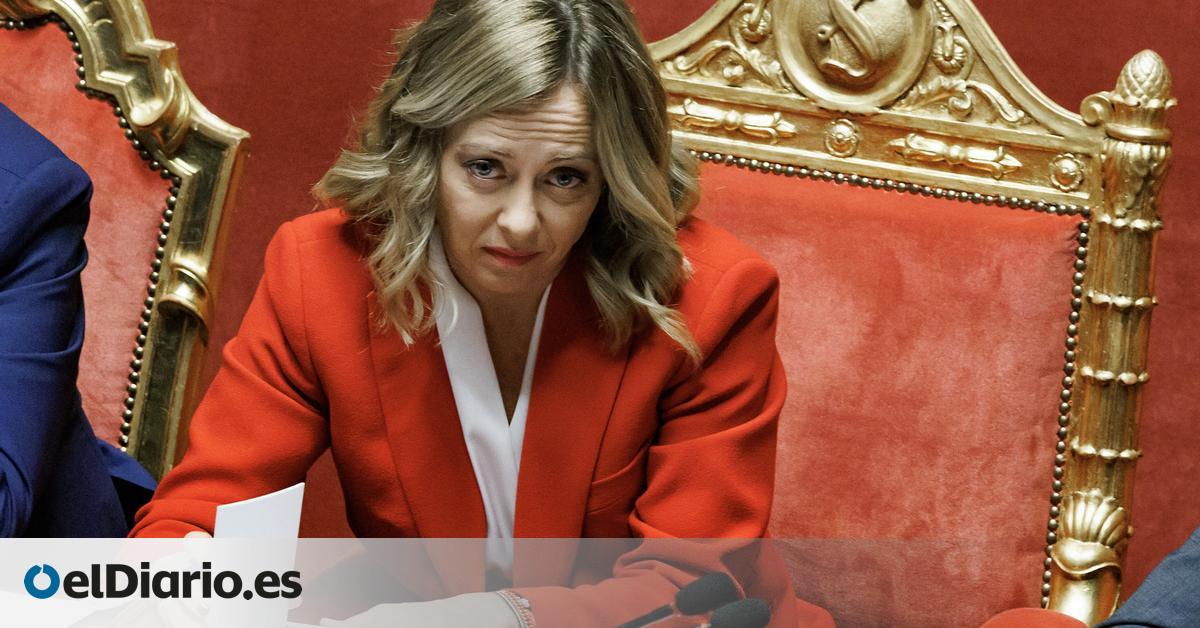
Giorgia Meloni does not want to go back, she does not want the deportation plan to Albania, which has become a model in the EU, to end in failure, after a Rome Court on Friday refused to endorse the detention of the first 12 migrants in the centers built by Italy on Albanian soil. And so, after two days of attacks on the magistrates that recalled the harshest tones of the eternal struggle between Silvio Berlusconi and justice, the President of the Government has redoubled the bet in a Council of Ministers meeting this Monday afternoon to approve a decree whose urgency is only justified by the intention of shielding as soon as possible those enclaves of Italian jurisdiction built on the other side of the Adriatic.
The decree law – with a higher rank than the ministerial decree in force until now – establishes a list of “safe countries” to circumvent the veto opposed by the magistrates who relied on a recent ruling by the Court of Justice of the European Union that, On October 4, he ruled that a country can be considered safe only if it really is safe in its entirety. A definition that eliminated in fact from the list to several countries, including Tunisia, Egypt and Bangladesh. These last two were the states of origin of the 16 migrants initially deported to Albania, before, a few hours after disembarking, four of them had to be returned to Italy, two for being minors and two for being considered “ “vulnerable.”
The judges’ ruling called into question one of the pillars of the operational protocol signed by Italy and Albania a year ago for the opening of the centers in the Albanian towns of Gjader and Shengjin: only adult men rescued by the authorities should be sent there. Italians in the Mediterranean from countries considered safe.
“This makes it a primary rule (…) to offer the application of a law of unequivocal interpretation, in our opinion. I say this with great respect for the judiciary,” the Minister of the Interior, Matteo Piantedosi, stated in a press conference. “This is a list of 19 countries, compared to the 22 initially planned,” stressed the head of Viminale. “Those that we have excluded are Cameroon, Colombia and Nigeria on the basis of considerations that come precisely from that ruling of the Court of Justice of the EU that in some way had introduced a criterion for evaluating the integrity of the territory of the countries that were are affected by this statement. The operation we have done is to summarize them in a legal norm, thus elevating them to the rank of primary norm, and this also for the logic of creating uniformity of criteria in the national territory,” he added.
The origin of “safe third countries” allows the application of another of the pillars of the Albanian plan: the application of an accelerated procedure for the examination of asylum applications, which cuts the time for the first evaluation to 28 days and reduces it to seven the deadline to file an appeal in the event of a first rejection by the commissions in charge, which, in the case of migrants deported to Albania, manage the procedures by videoconference.
For the Minister of Justice, Carlo Nordio, the shield approved by the Council of Ministers should be enough to avoid other rulings such as those of the Court of Rome that he called “abnormal”, in statements for which the opposition called for his resignation. “If the judiciary is overwhelmed, we must intervene,” Nordio said. “The ruling of the EU Court was not disregarded by us, but rather misinterpreted by our judges. The definition of a safe country cannot depend on the judiciary, but is a political evaluation within the parameters of international law.”
His words were the prelude to two days of a verbal offensive by several representatives of the Government against “politicized justice” and the “red robes”, which ended with the publication on Sunday by Meloni of decontextualized fragments of an email sent by a magistrate in which it seems that the judges are uniting against the Government.
“I will find a solution to this problem too,” Meloni had said from Beirut on Friday, after calling the judges’ decision “prejudicial.” But, as several experts have been repeating since then, it is not at all clear that the shortcut found by the Government led by the ultra Brothers of Italy party serves to truly protect the plan that Meloni wants to defend at any cost.
In a non-figurative sense, the costs that the centers have entailed and will entail in the coming years – some billion euros, according to estimates – have been the subject of a complaint to the Court of Auditors by the opposition 5 Star Movement (M5S ).
But the highest cost – lawyers and NGOs have been denouncing for months – is paid by migrants who become cogs in this new experiment, blessed by the president of the European Commission, Ursula Von Der Leyen, of erosion of the right to asylum. .
Source: www.eldiario.es

